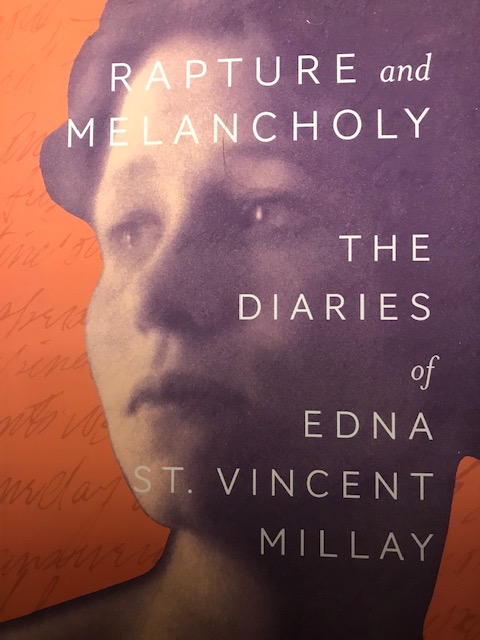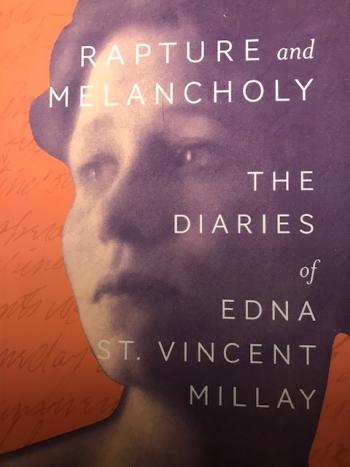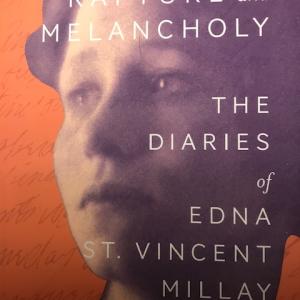A Book Recommendation from Millay House Rockland: ‘Rapture and Melancholy’
While reading Rapture and Melancholy, the newly published diaries of Edna St. Vincent Millay, lightly yet thoughtfully edited by Daniel Mark Epstein and with a foreword by Millay literary executor Holly Peppe, I found myself envisioning this book affecting others’ lives, creative and otherwise.
Diaries are, first and foremost, primary source material. In Rapture and Melancholy, you are not reading an interpretation of Millay’s life and its events; you are reading her own words, available publicly now for the first time, written in the privacy of her room, home, or bed.
You are privy to directly hearing a youthful voice from the beginnings of her confidence in herself as writer and poet; a biographer would have to quote her to provide the same immediacy.
In this volume spanning four decades, Epstein contextualizes Millay’s diary entries with introductions to each phase of her life. Excellent biographies, which provide a more complete context to the diary, are available locally at Arctic Tern and Hello Hello bookstores, including Mr. Epstein’s What Lips My Lips Have Kissed, and Nancy Milford’s Savage Beauty. These volumes can fill narrative gaps in the diary that occurred as Millay’s life became busier and her entries more sporadic.
As do most literary diaries, Rapture and Melancholy brings Millay’s daily internal and external landscapes into focus—her many responsibilities for her household, absent her divorced, working mother; her delight at her poetry being recognized; friends she made and the places they frequented, in Camden and its environs; her college life, life in Greenwich Village, and her life in Austerlitz, New York.
Entries begin in 1907, when she was 15, revealing lives lived in turn-of-the-century Maine and what was important to a young woman, including such things as how much fabric cost and who made clothes for Edna and her sisters.
The diary’s immediacy enables readers to observe her love of music, feel the winter cold and her frustration with incessant rain, envision the hills she climbed while “maying” (welcoming springtime by gathering flowers), and to confront her challenges, from doing 12 hours of laundry to coping with a sister who routinely dirtied her finest clothes immediately after donning them.
Entries are fewer between 1914 and 1927, when Millay was attending Vassar and traveling abroad; and at the end of the diaries, the reader finds Millay addicted to painkilling drugs, recording only intake times and dosages in an attempt to curb their use.
This may disappoint or skew some readers’ views of her, but here undeniably, is a front row seat to a vibrant, highly intelligent individual’s thoughts, accessible and authentic in a way no other writing can be. Rapture and Melancholy is a chronicle in Millay’s own words of how she developed the skills and courage to live unconventionally and present her art to the world.
Years ago, I read Virginia Woolf’s Writer’s Diary, which her husband distilled to focus largely on her writing life. The people and places she wrote about so intrigued me that over the next few decades, I read all her novels, essays, short stories, the multiple volumes of her letters and diaries, as well as biographies and literary criticism.
Reading her work and delving down numerous literary and historical rabbit holes informed my own writing. I went to England in 1985 to walk the London squares, find her houses and bookstore haunts, and visit the country house where she wrote some of her books. Seeing her houses and sitting in her garden, where stand the two companion trees beneath which she and her husband are buried, suggested to me creative possibilities into which to venture and roam.
In a local attempt to enhance and preserve Millay’s legacy, I am a member of the Millay House Rockland board of directors. Our organization is restoring her birthplace on Broadway to preserve the house and eventually, a garden, and provide programs that will inspire people to read and write poetry or share their stories. Just as visiting Woolf’s homes and reading her work helped me develop a writing career, may Rapture and Melancholy lead readers back to Edna St. Vincent Millay’s poetry and other work, and ultimately, to having the courage to do likewise.
























